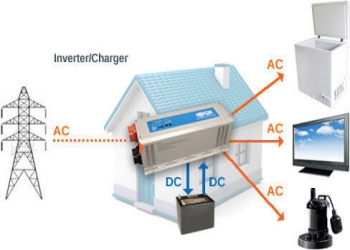How big of a home inverter system do I need to run my house?
Home inverter system has the advantages of efficient conversion, intelligent management, and strong adaptability. Choosing the right inverter product by understanding power needs, considering renewable energy sources, energy storage systems, efficiency, noise, safety, and budget can better meet household power needs and achieve household power self-sufficiency. Home inverter system has become the choice of more and more families. So, as ordinary consumers, how should we understand and choose the appropriate home inverter system to meet our needs? This article will detail a home inverter system's characteristics, advantages, and application scenarios and how to choose the appropriate model and capacity.

Features and advantages of home inverter system
1) Efficient conversion: Home inverter systems can convert renewable energy sources into direct current power and then invert it into alternating current power for home use. This efficient conversion process minimizes energy losses.

2) Intelligent management: The home inverter system has smart management functions, which can realize real-time monitoring, control, and management of the power system to ensure the reliability of the power supply.
3) Strong adaptability: The home inverter system suits families of all sizes. Appropriate models and capacities can be selected according to household power needs to meet power needs in different scenarios.
4) Green and environmentally friendly: Using renewable energy and intelligent management can reduce dependence on traditional animation, reduce carbon emissions, and benefit environmental protection.

Application scenarios of home inverter system
1) Solar power generation system: Convert the DC power generated by solar panels into AC power through an inverter for household use. At the same time, excess electrical energy can be stored in the battery for emergency use.
2) Wind energy power generation system: The DC power generated by the wind turbine is converted into AC power through the inverter and supplied to each household. Because of the instability of wind power generation, energy storage equipment is required to ensure the reliability of the power supply.
3) Energy storage system: During peak power demand periods or power failures, the inverter can convert stored electrical energy into alternating current to ensure household power needs.
4) Electric vehicle charging system: converts direct current into alternating current to charge electric vehicles. Electric vehicles can be used as mobile energy storage devices to realize time-sharing utilization of household electricity.
5) Smart home system: Used in conjunction with the smart home system to achieve remote control and management of the power system, improving the convenience and comfort of home life.
How to choose a suitable home inverter system
1) Understand the electricity needs: When choosing a home inverter system, you must first understand the home's electricity needs, including daily electricity consumption, peak demand for electricity, and possible future growth in electricity consumption. Select the appropriate model and capacity according to power demand to ensure the stability and reliability of the power supply.
2) Consider renewable energy: If your home has a solar or wind power generation system, you must choose an inverter model and capacity matching the power generation system. At the same time, the power generation amount and usage time of renewable energy need to be considered to determine the continuous power supply capability of the inverter.
3) Consider an energy storage system: If your home needs to deal with unexpected power outages or peak power periods, you need to consider an energy storage system. Choose an inverter with energy storage capabilities to continue to provide power during a power outage.
4) Pay attention to efficiency and noise: Efficiency and noise are essential when choosing an inverter. Generally speaking, efficient inverters reduce energy losses and lower operating costs. In addition, the inverter's noise is a factor that needs to be considered, especially in environments requiring quietness (such as bedrooms).
5) Safety: Choose regular brands and certified inverter products to ensure their safety and reliability. At the same time, you must choose whether to have lightning protection, overload, short circuit, and other protection functions according to actual needs.
6) Budget: The last thing to consider is your budget. Choose cost-effective inverter products based on actual needs and budget range.
Supplier
PDDN Photoelectron Technology Co., Ltd. is one of the leading enterprises in the Home Accessory and Solar Power System, which is fully involved in developing the power industry, intelligent operation and maintenance management of power plants, solar panels, and related solar products manufacturing. We will be committed to providing users with high-quality, efficient products and considerate service.
It accepts payment via Credit Card, T/T, West Union, and Paypal. PDDN will ship the goods to customers overseas through FedEx, DHL, by sea, or by air. If you want a high-quality home inverter, please send us inquiries; we will be here to help you.
